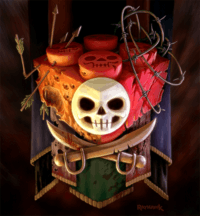BrikWars

BrikWars is a miniatures wargaming system by Mike Rayhawk, created for use with plastic building blocks and figurines. It is designed to be simple and flexible, allowing for its players' full range of creativity in creating armies, creatures, vehicles, and worlds out of construction toys. Although targeted primarily at adults, BrikWars is known for its straight-faced acceptance of the kinds of ridiculous scenarios and multi-genre mashups that arise naturally when children dump out their unsorted toybins on the floor. Much of its humor comes from satirizing "serious" wargames and their players, while flouting or deliberately misinterpreting conventions of the genre.
| “ | BrikWars is the plastic-brick wargaming system that throws the peaceful worlds of your favorite construction toys into wanton chaos and destruction! | ” |
BrikWars uses "minifigs" (usually Lego minifigures or equivalent miniature figures from other construction toy brands) as small soldiers, and terrain constructed from construction bricks or random objects found near the playing area. While the game can be played with completely non-construction-toy-related objects, such as action figures, stuffed animals, or chessmen, the rules lend themselves best to figures and structures which can be easily disassembled and reconstructed. These models might represent real or imaginary forces and situations, but are just as likely to represent exactly what they are - toys engaging in arbitrary battles for toy supremacy.
Play mechanics
BrikWars is a turn-based skirmish-level miniatures wargame. Each player in the game controls forces custom-built from construction toys or whatever materials they have at hand. The creations are assigned attributes according to the current size and features of the physical models at any given moment. Because constructible models can be easily damaged, augmented, or destroyed with the addition or removal of construction elements, a unit's abilities can vary greatly over the course of a battle.
Players take turns, with each player moving and attacking with each of his units able to do so, before passing the turn to the next player in sequence, until each player or team has succeeded or failed in their objectives. With rare exceptions, each unit is able to move once (a number of inches based on its "Move" statistic) and take one major Action (usually to make an attack, or to use one of its special abilities known as a "Specialty") in a given turn, in addition to any number of minor actions.
For determining the success or failure of actions and attacks, each unit is assigned an appropriate-sized polyhedral die for its Skill attribute, which it must roll against a set number determined by the difficulty of the act. When an attack successfully hits, the attacker rolls his weapon's damage dice in the hopes of overcoming the target's Armor dice roll. Most infantry units are killed by having their Armor overcome once, while larger vehicles and structures are more resilient and may take multiple hits before being destroyed.
The rules also encourage players to disobey the rules as often as possible, as seen in the "Law of Fudge",[2] and for special Hero units with the ability to ignore the rules completely once per turn with a Heroic Feat.[3] The rulebook repeatedly encourages fun over obsessive rules-lawyering, with an emphasis on making the game as enjoyable as possible for all parties involved.
History
BrikWars originated in 1995[4] as an extensive expansion of an earlier game entitled Legowars,[5] a miniatures wargame invented in March 1991 by Eric O'Dell and R. Todd Ogrin. Legowars gained a cult following on local bulletin board systems before becoming more generally known on the Usenet newsgroup rec.toys.lego.[6] The game featured space-themed combat between Lego minifigures, and was distinguished from other miniature wargames of the time by a strong building-brick construction theme allowing the customization of playing pieces. It was followed in January 1995 by an Internet-released sequel, Legowars II, which the authors had refined in the hopes of making the game more attractive for publication.
In October 1995, the authors of Legowars received a cease and desist order from the Lego Group for their improper usage of the trademarked word "Lego``.[7] Their proposed renamed version, Butthead Toy Company Wars, never came to fruition, and several unrelated authors released their own variants, expansions, and alternate systems to try to fill the void.[8] Of these, only BrikWars was updated and maintained for any length of time following its release.
This first version of BrikWars was written and circulated locally at Cornell University in several modified versions between in 1995 and 1997. A version released to rec.toys.lego in February 1997[9] became the game's first definitive edition.
New editions were released for 1998, 2000, both Spring and Summer 2001, and 2005.[10]
The current BrikWars edition is BrikWars 2010. Despite the name, the 2010 rulebook remains under active and extensive development as of 2014.[11]
BrikFiction
Fans of the Brikwars game system have devised a timeline of the construction-toy universe, and have written extensively about the history of the "Brikverse". This history is largely based on the sequence of the releases of official LEGO sets, and the factions and forces found therein, augmented in later years by the addition of popular player factions. The full account of this history can be seen here.
References
- ↑ http://www.brikwars.com
- ↑ http://www.brikwars.com/rules/2010/1.htm#4
- ↑ http://www.brikwars.com/rules/2010/6.htm#3
- ↑ http://brikwars.com/wiki/index.php?title=Versions
- ↑ http://mama.indstate.edu/users/sean/legowars/index.html
- ↑ https://groups.google.com/d/msg/rec.toys.lego/KgK_MzqFHRg/3SDI1Op5p4sJ
- ↑ http://www.sjgames.com/ill/1995/ill-oct95.html
- ↑ http://www.brikwars.com/wargames.htm#lwars
- ↑ https://groups.google.com/d/msg/rec.toys.lego/qlHeoyWsmwQ/Ed14mBU2ilEJ
- ↑ http://brikwars.com/wiki/index.php?title=Versions
- ↑ http://www.brikwars.com/forums/viewtopic.php?f=5&t=5452